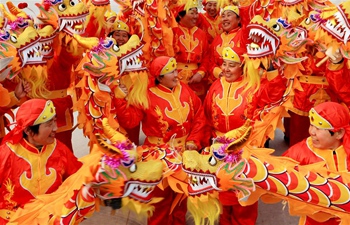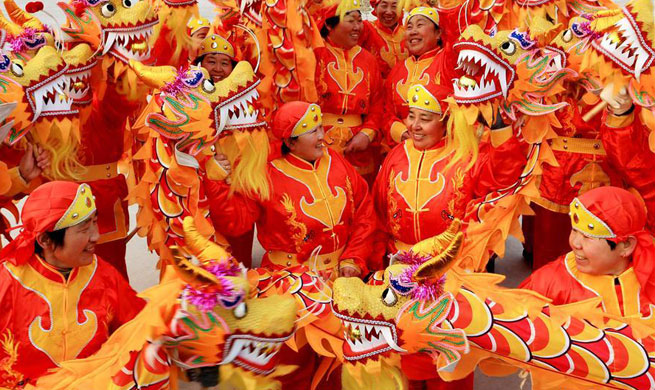ZHENGZHOU, Jan. 27 (Xinhua) -- The undivided love of her parents that Si Xiaoxue enjoyed in her childhood merely compounded the bitterness she felt when her father was diagnosed with cancer.
China's one-child generation have no siblings from whom to seek help.
Si had to take leave from her work. When more leave was no longer an option, she worked all day and tended to her sick father at night.
"It's a real struggle," the 34-year-old said. "Sometimes I just want to quit my job, but now I need the money more than ever."
Si pays monthly medical bills of more than 10,000 yuan (1,500 U.S. dollars).
TIME TO CARE
For thousands of years, the Chinese have relied on their children to take care of them in their old age. However, the Chinese have traditionally had many children. For the one-child generation like Si, the emotional, physical and financial burden they are expected to bear is a punishingly heavy one.
To relieve that burden, legislation in some parts of the country now allows employees to take time off, with full pay, to care for their sick parents.
In central China's Hunan Province, an only child is allowed to take up to 20 days off each year if his or her parents are over 60 and in hospital. Similar rules apply in south China's Guangxi Zhuang Autonomous Region, where 15 days off are allowed. Salaries, allowances and bonuses may not be reduced during leave. The pattern is being repeated in Chongqing, Fujian, Guangdong, Hainan, Heilongjiang, Henan and Hubei.
After more than 30 years of the one-child policy, care for the elderly has become a very difficult issue for individual families and a social problem which the government must address.
There were about 230 million people aged 60 or over in China at the end of 2016, close to 17 percent of the population. More than half of them were "empty-nesters," who live apart from their children.
SIX WALKING STICKS
When the one-child policy was in force, the "six pairs of pockets" syndrome was well documented. Each only child generally had two parents and four grandparents, all of whom put their hands in their pockets to feed, cloth, and often spoil, the child.
Today the pyramid is inverted and a single child may have six elderly relatives to support, the "six walking sticks" syndrome.
"The burden of elder care in a single-child family has become a widespread, and very serious, social problem in China," said Li Zhiqiang, a legal expert at Lanzhou University. "Legislation which allows them to take time off work is just one way that the government can support them."
However, the idea of paid elder-care leave has triggered heated debate with more concrete action needed to avoid the leave being only a term on paper. Chinese people are often very reluctant to take time off work and employers equally unwilling to allow them to.
Wang Di, a Hangzhou-based demographer, said that many details of the legislation need further discussion, such as how to ensure that all only children in China enjoy the special leave and how to guarantee that the leave is truly used to care for elderly relatives. There are also issues of grandparents to consider
"The responsibility of the implementation of elder care leave lies with the employers," said Si. "The leave needs to be incorporated into the Labor Law with effective policy support."
SHARING THE BURDEN
"Reliance on elder-care leave alone is not enough," said Li. Only a comprehensive social welfare system can develop more, better ways to care for seniors, community-based and institutional care as well as in-home services.
His view is echoed by Si whose father has lain in bed for years. "The burden is like a huge mountain on my back, but one I will never set down."

















